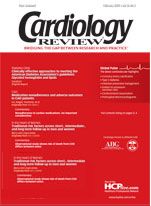Starting heart failure therapy with a beta blocker is alternative to starting with an ACE inhibitor
Heart failure
Stockholm—Starting heart failure therapy with a beta blocking agent leads to similar 2-year clinical outcomes compared with starting with an angiotensin-converting enzyme (ACE) inhibitor, but the beta blocker—first strategy may offer early advantages, according to the results of a new study presented at the 2005 congress of the European Society of Cardiology.
In the Randomized Cardiac Insufficiency Bisoprolol Study (CIBIS) III, survival and tolerability were similar after 2 years, regardless of whether patients were started on the beta blocker bisoprolol with the ACE inhibitor enalapril added after 6 months, or the reverse strategy in which enalapril was initiated first followed by bisoprolol. There was a trend toward better early survival with the beta blocker—
first strategy, however, which may be important considering that the risk of sudden cardiac death in these patients is particularly high during the first year of treatment, said Ronnie Willenheimer, MD, PhD, lead investigator of CIBIS III.
“Bisoprolol’s pronounced inhibition of the sympathetic nervous system, not seen with the ACE inhibitor, may be of particular value at this critical time point when the risk of sudden death is greatest,” he said. In contrast, patients who started with bisoprolol were more frequently hospitalized for worsening heart failure, especially early in the study.
The practice of starting heart failure therapy with an ACE inhibitor, as recommended in current treatment guidelines, is rooted more in tradition than evidence, said Dr. Willenheimer, associate professor in the department of cardiology, University Hospital MAS, Malmö, Sweden.
CIBIS III included 1,010 patients with a mean age of 72 years. All patients had New York Heart Association functional Class II to III heart failure and a left ventricular ejection fraction of 35% or less. They were randomly assigned to biso-prolol (target dosage of 10 mg/day) or
enalapril (target dosage of 10 mg twice daily) for 6 months, followed by their combination for 6 to 24 months.
The primary end point was the time to death or all-cause hospitalization. Non-inferiority of the bisoprolol-first strategy was demonstrated in an intent-to-treat analysis, in which the event rates were 35.2% in the bisoprolol-first group and 36.8% in the enalapril-first group.
The prespecified criterion for noninferiority was not met in the per-protocol analysis, in which the event rates were 32.4% and 33.1% in the bisoprolol-first and enalapril-first groups, respectively.
There were a large number of protocol violations and withdrawals in the per-protocol sample, which prevented the per-protocol analysis from having the same statistical power as the intent-to-treat analysis, explained Dr. Willenheimer, making the intent-to-treat analysis at least as relevant as the per-protocol analysis.
Sixty-five people died in the bisoprolol-first group compared with 73 in the enalapril-first group, corresponding to a nonsignificant 12% reduction with the bisoprolol-first strategy. During the first year, the bisoprolol-first strategy led to a 31% reduction in mortality, which did not quite reach statistical significance (P = .06).
“If patients survive the early phase, they will enjoy the benefits of multiple treatments,” said Dr. Willenheimer. “We can’t start all of these treatments at once. We feel that it’s important to know which drug is best to start with. CIBIS III clearly shows that if you start with bisoprolol rather than enalapril, patients won’t do worse.”
